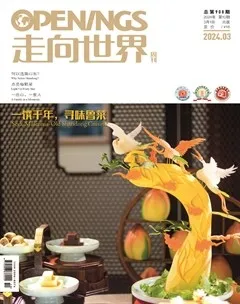一馔千年,寻味鲁菜
本刊编辑部
汪曾祺在《人間滋味》中写道:四方食事,不过一碗人间烟火。
真正的生活者,源于对食物的无比热爱。民以食为天,食以礼为先。中国饮食文化源远流长,早在商周时期就形成膳食文化的雏形,唐宋年间逐渐成形并走向高峰,到清代已逐渐形成了川鲁粤苏等菜系,并在清末至民国时期正式形成“八大菜系”。
饮食,是绽放在舌尖上的文化,凝聚着一个地区的精气神,每一个菜系都是各自地理特点、人文风俗和性格习惯的浓缩。在中国美食领域,鲁菜是一个特别的存在,没有鲁菜,就不可能衍生出如今多滋多味的菜系品种。作为中国多样化菜系源头之一的鲁菜,是中国唯一自发型菜系、八大菜系之首和北方菜的代表。起源于春秋战国、鼎盛于元明清,有2500年的发展史;以山珍海味为材,既有宫廷宴席,也有市肆美食;技法丰富、难度最高,也最见功力;数十种烹饪技法,上千道菜品,“满汉全席”中一半的佳肴来自鲁菜……掀起鲁菜的神秘面纱,其承载着的丰富历史和独特文化令人惊叹。
地方特色,其精髓就在于“地方”二字。当我们翻开历史的画卷,追溯鲁菜源流,在感叹物华天宝、人杰地灵的同时,会更加深刻地领悟到鲁菜厚重的文化底蕴。
“齐带山海,膏壤千里。”齐鲁大地,山海相拥,优越的地理环境造就了山东强大而丰饶的物产,诞生了既有擅长烹制肉类菜肴的济南菜,也有以海鲜菜品驰名的胶东菜。
齐鲁之地,礼仪之乡。孔子曰∶“夫礼之初,始诸饮食。”两千多年来浸润着儒家学派“食不厌精,脍不厌细”的精神追求,终于成就鲁菜的洋洋大观。将儒家思想与美食结合形成的孔府菜,是古代官府菜的最高水准。
鲁菜之所以流传千年,发展至鼎盛,享誉中国烹坛,皆因得“天之厚、地之华、人之灵”,而“人之灵”则体现了世代劳动人民的勤劳与智慧。从春秋时期易牙擅于调味,到明清时期山东厨师主导皇宫御膳房,再到民国时期山东帮在京师餐饮业独领风骚,直至今天鲁菜泰斗王义均和国宝级烹饪大师崔玉芬传承发扬,勤劳而聪慧的山东人民懂得充分利用本地食材,将普通的食材变为令人垂涎欲滴的美食。无论是宴席上的珍馐美馔还是乡村家庭的简单饭菜,鲁菜讲究酸甜苦辣咸五味的平衡,不仅注重口感,更融入了人生的哲学。
属于鲁菜的黄金时代,曾经热烈地存在过。可能有人会说,鲁菜如今呈式微状,实在没有什么存在感。鲁菜不常见?其实鲁菜处处见。在百姓餐桌上的家常菜里,到处都有鲁菜的影子:油焖大虾、爆炒腰花、熘肝尖、木须肉、烤鸭、糖醋里脊、炸丸子、爆炒里脊、辣子鸡丁……就连爆、炒、烩、蒸、煎等中式菜肴烹饪手法,或多或少都有些鲁菜的底色在其中。
原来,鲁菜早已以细雨润无声之姿,沁入了所有人的生活里,化入寻常百姓家中,为我们的生活添上了一丝烟火气,让人“才下齿尖,又上心头”。
编辑/郭晓娟
In Chinas food field, Shandong cuisine is special. Without Shandong cuisine, todays wide variety of cuisines could not have been derived.
Shandong is encircled by mountains and the sea. Its superior geographical environment has brought it strong and rich natural resources, and fostered Jinan cuisine featuring meat dishes, and Jiaodong cuisine famous for seafood.
Shandong is the old site of Qi and Lu, and a land of ceremonies. For over two millennia, it has been influenced by the Confucian spiritual pursuit of “eating rice of the finest quality, and meat that is finely minced”, and finally developed the grand style of Shandong cuisine. Kong family cuisine combining Confucianism and food represents the highest standard of ancient official cuisine.
From Yi Ya adept at seasoning in the Spring and Autumn Period to Shandong cooks leading the imperial kitchen in the Ming and Qing Dynasties, then to Fushan cooks taking the lead in the capital catering industry during the period of the Republic of China, and finally to todays Wang Yijun, a leader of Shandong cuisine, and Cui Yufen, a national master chef, who pass down and carry forward cooking techniques, the industrious and smart Shandong people know how to make full use of local ingredients, and turn ordinary ingredients into mouthwatering delicacies.
Is Shandong cuisine rare? Actually, Shandong cuisine exists everywhere. The traces of Shandong cuisine are hidden among home-cooked dishes on your table. Basically, all Chinese cooking techniques have the background of Shandong cuisine. You cannot imagine that Shandong cuisine has nourished everyones life without a sound.

